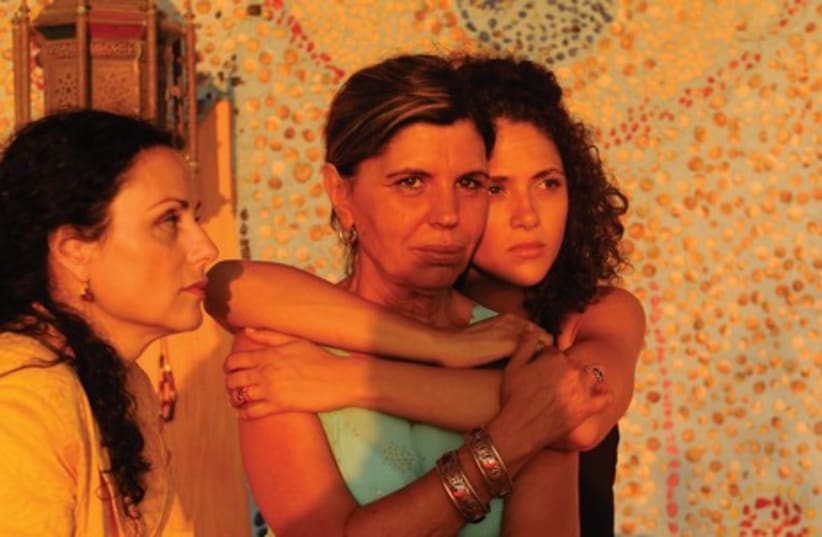ORANGE PEOPLEWritten and directed by Hanna Azoulay HasfariWith Hanna Azoulay Hasfari, Rita Shukron, Esty YerushalmyHebrew title: Anashim KetumimRunning time: 90 minutesIn Hebrew, Moroccan andArabic. Check with theaters for subtitle information.
If you’ve lived in Israel for a few years, you may have met a Mizrahi woman of a certain age – often, but not always, she’s Moroccan – who seems almost preternaturally talented and capable but has little or no formal education. She’s the matriarch, the rock of her family, but she gets scant respect from the men in her life and is often quite hard on her daughters. She may have no skills that would look good on a resume, but she can make a house sparkle, bathe and dress a dozen toddlers and have a delicious, intricately spiced meal for 20 on the table in the time it takes most of us to check our email. I’ve often thought I would love to see a movie that gets inside these women’s heads and find out what it’s like to straddle the worlds of Westernized Israeli culture and Moroccan-Jewish culture, where what we deride as superstition is simply tradition.Several Israeli films, such as Sima Vaknin Witch and My Lovely Sister, have tried to portray these kinds of women convincingly on film, with mixed results. Orange People, veteran Israeli actress Hanna Azoulay Hasfari’s visually stunning directorial debut, is modeled after such international food-oriented, magic realism films such as Like Water for Chocolate and The Mistress of Spices. Hasfari has tried to create a comic and dramatic epic about a Moroccan matriarch who makes a living predicting the future, but the film relies on grating stereotypes and situations that are not terribly funny played for comedy.The film starts out promisingly in the ramshackle house on the beach where Grandma Zohara (Rita Shukron) lives with her family. An intuitive woman who may or may not have genuine extrasensory powers, she was married off as a young girl to an older man she didn’t know or love. But she has always had a strong sense of herself and her power. Now elderly, she helps support her daughter, son-in-law and granddaughter by predicting people’s futures after she touches an object that belongs to them.But she is losing her grip, and someone must take over the family business. In this leisurely paced film, you’ll have ample time to ask why the business must continue, but this would be like asking “Why don’t they just go to the police?” during a Hitchcock movie. The tradition must be carried on because otherwise the film would have no plot.Her daughter, Simone (Esty Yerushalmy), is the logical successor, but she is frail and doesn’t want to follow in her mother’s footsteps. She has a failing restaurant in Tel Aviv, where she serves Moroccan food but doesn’t have her mother’s legendary culinary skill and is losing business to a trendier Russian restaurant across the street. She is distant from her husband, Jackie (Yoram Toledano), who supports her ambition with the restaurant to a degree but doesn’t really believe in her.Then Fanny (Hanna Azoulay Hasfari) returns from Paris after an absence of many years. She is more sophisticated and liberal than Simone. The two have a strong bond, even though Fanny had a romance with Simone’s husband. But as is common in highly symbolic magical realism films, the two sisters are different types that complement each other. Simone helps Fanny reconnect to her roots, and Fanny helps Simone assert herself and go for her dreams.The modern-day story alternates with flashbacks to Grandma Zohara’s life as a young bride in Morocco.While the acting is strong and the script has been carefully thought out, it’s all played too broadly to be really affecting, and each character’s comic quirks, which are meant to be endearing, are more often annoying. I didn’t leave with any insight into the inner lives of the Moroccan matriarchs I’ve known. Azoulay clearly feels a strong connection to this material but didn’t translate her internal experience well to the big screen.
Misdirected Mizrahi matriarch
‘Orange People’ needs more juice.
